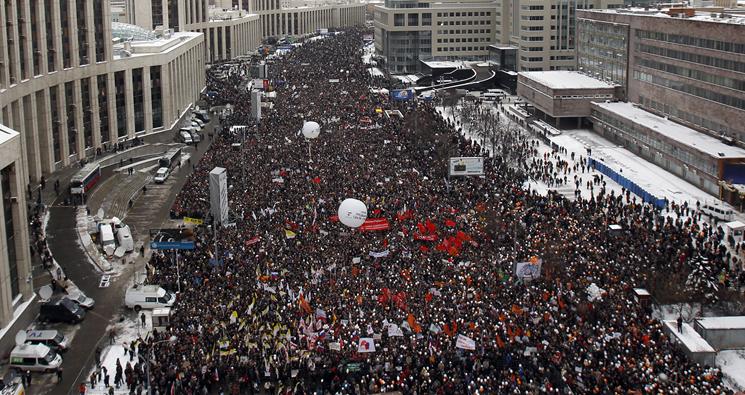Russian Protesters Organize Online
Tens of thousands of people have taken to the streets of Moscow in response to the December fourth elections. One of the protests drew a crowd of approximately 100,000 people, the largest since the fall of the Soviet Union over twenty years ago. The protesters believe former President and current Prime Minister Vladimir Putin's Party, United Russia, would not have done as well in parliamentary elections if it weren't for vote manipulation.
Dissatisfaction with the electoral system is not exactly new for Russians, and I can't imagine that people believed it would be different this time around. But there is a new way for people to speak out and fight back, the internet. That's why when the results came through on December 4th, an outburst of political discourse erupted online.
Historically the Russian government has held a tight grip on the messages distributed in the media. Therefore it is not immediately clear if any opposition leaders can rise to the level of national political leader or what solutions there might be to the current political regime.
It was reported that the crowd chanted, "Russia without Putin" and "New elections, New elections." Without the ability for the opposition to get their message out in the government-controlled news, protesters have taken to social media platforms such as Twitter and Facebook.
In a recent visit to Moscow, I asked a young man who had participated in a rally how protests of such magnitude are being organized? He responded simply, "Facebook." Organizers of the rallies create private events and distribute them throughout their personal social network. Those friends that are invited are then able to invite their friends, and you can imagine that it snowballs from there. If a Facebook user accepts an invite-only event, then only the people invited will be able to see the RSVP list or that the event even exists in the first place. For the most part, this keeps these truly grassroots events away from the eyes of government monitors.
So, Facebook has given people the platform to organize, but the question still remains, what specifically are the protesters trying to accomplish? Where are people getting information about opposition leaders? And how are they learning about alternative solutions to current government policies that are allegedly so corrupt? I asked this question to an attorney who has taken part in the protests, and again the response was clear and simple, "Twitter."
Opposition leaders have emerged and even been created by social media. We don't know for sure how much short-term change we’ll see in the Russian electoral system but we do know for certain that more anti-government protests are anticipated to happen in the near future. In fact, the next large scale protest is being organized right now to take place in February, a month before Prime Minister Vladimir Putin faces a presidential election he is expected to win easily.
Yet, as I heard often from many different Russians in Moscow, anything could happen, and nothing can be taken for granted.

